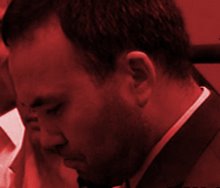Mr. Harper Finally Acts And Defends Huseyincan Celil
Considerably Good News
Since Huseyincan Celil’s detention, Prime Minister Mr. Harper defends Husyincan Celil in political arena first time and meets with the Chinese President Hu Jintao. We consider this act of our Prime Minister is just accurate and respectable. We are hoping in the near future that we can assure Celil’s wellbeing and eventually his safe return to
Some recent news coverage’s are below
PM's push on Celil cheers family
 Canadian Press Photos Prime Minister Stephen Harper And Hu Jintao |
| |
Top of the World
TORONTO (Nov 20, 2006)
It was brief and unofficial. But the meeting between Prime Minister Stephen Harper and his Chinese counterpart is an "important first step," say those fighting for the release of a Burlington man jailed in China.
Chris MacLeod, a lawyer representing the family of Chinese-Canadian Huseyin Celil, centre photo, said Harper's commitment to address the issue with Chinese President Hu Jintao, at right, shows Canada won't tolerate China's disregard for international law or its poor treatment of Canadian citizens.
Celil was arrested while visiting relatives with his wife and children in Uzbekistan last March, and was extradited to his native China in June. His family fears he could face the death penalty for his activism on behalf of China's minority Uighur population.
Neither his family nor Canadian officials have heard anything about Celil since his arrest.
Harper wouldn't discuss Hu's reaction to Celil's case, but a Chinese official told Canadian reporters that it's his country's perspective that Celil is Chinese, even though he has officially renounced that citizenship.
Kamila Telendibaeva, Celil's wife and the mother of his four children, was hoping for more answers regarding his incarceration, health and ultimately the timeline for his release. But she was still thankful Harper brought up the subject.
China has signed the Vienna Convention on Consular Relations, but has been criticized for failing to live up to its obligations, which include notifying Canada if it has detained one of its citizens, allowing access to that person and providing him with legal representation and a fair and transparent trial.
in foreign affairs
Morality in politics is two-edged. If enough people agree with the principled stand a politician makes, he is a hero. If they do not, he is a fool. This is the curious position in which Prime Minister Stephen Harper finds himself after his blunt (critics would say impolitic) criticisms of China for jailing a man from Burlington named Huseyincan Celil.Celil was born and raised in the Xinjiang region of China. He's also a member of China's Uyghur minority, a Muslim Central Asian.Friends call him a political activist. China calls him a terrorist. In the '90s, he was arrested and spent time in jail. His crime, according to his lawyer Chris MacLeod, was to illegally teach children the Uyghur language. Using a false Turkish passport, he fled China for neighbouring Kyrgyzstan, eventually ending up in Turkey where he obtained United Nations status as a refugee.In 2001, he came to Canada. Last year, he became a Canadian citizen. This spring, he travelled on his brand-new Canadian passport to Uzbekistan, also in Central Asia, to visit his in-laws.There, he was arrested, on no particular charge, and extradited to China — where he was sentenced to 15 years in jail on charges of murder and terrorism. His family and friends say the charges are invented. Human rights groups like Amnesty International say Celil's experiences match those of other Uyghurs who have suffered persecution for trying to exercise basic civil rights.As Celil languished in jail, civil libertarians lambasted the Harper government for failing to press Beijing harder for his release.So, this week, it seems, Harper did. He told Canadian reporters travelling with him to an economic summit in Vietnam that Canada values the freedom of its citizens more than it values trade. If that led China's President Hu Jintao to snub him at the summit (which appeared to be the case at the time), he said, then so be it."(Canadians) don't want us to sell that out to the almighty dollar," the Prime Minister said.At one level, Harper's interest in a Uyghur from Burlington might seem odd. To many Canadians, the Conservatives are the party of the almighty dollar.Certainly a lot of those with dollars think so. Harper's words have earned reprimands from many of his party's natural allies in the business world, who worry that anything other than the smoothest political relationship with Beijing could interfere with their plans to make scads of money from China.Even Harper's home province isn't pleased. "This is a misstep by the prime minister," Alberta's Intergovernmental Affairs Minister Gary Mar told one newspaper, noting that Harper's comments might hurt the tourist trade.Yet, in a more fundamental way Harper's position on the Celil case is consistent with his approach to all foreign relations. Even before becoming Conservative leader, he talked of the need to reintroduce morality into foreign affairs. "The emerging debates on foreign affairs should be fought on moral grounds," he wrote in 2003. "Modern liberals ... are trapped in their framework of moral neutrality, moral relativism and moral equivalence. But conservatives should have answers."Those particular lines were written to justify Harper's belief, written around the time of the invasion of Iraq, that Canada should hew rigorously to the position of U.S. President George W. Bush as he tried to remake the Middle East.In hindsight, they also signalled his current unbending position on Canada's involvement in Afghanistan. As Harper wrote then, morality in foreign affairs demands that countries choose sides, support their allies to the end and put real military force behind that commitment.All of which is to say that those who applaud the Prime Minister's unwillingness to sacrifice a Canadian from Burlington for trade must understand that this stubborn sensibility defines his approach to just about everything in the realm of foreign affairs — from the Israeli invasion of Lebanon to Canada's relationship with the U.S.To Harper, countries that share Canada's moral principles, such as Israel and the U.S., deserve unconditional support. Those that do not — like China —must be treated with suspicion. Is this laudable? In Celil's case, the answer is surely yes. Harper is supporting a Canadian citizen who was, in effect, kidnapped abroad.Still, it would be interesting to know what Harper would have done had Uzbekistan extradited alleged terrorist Celil not to China but to the U.S. prison camp at Guantánamo Bay. Which of his principles would have held then?
http://www.canada.com/findit/search/site/index.html?q=celil&p=9

y Darren Schuettler
HANOI (Reuters) - Canadian Prime Minister Stephen Harper finally got his 15 minutes with Chinese President Hu Jintao, ending a mini-controversy over whether they would meet during an Asia-Pacific summit.
The 15-minute chat occurred just before a gala dinner on Saturday for the leaders of the 21-member Asia Pacific Economic Cooperation meeting in Hanoi.
"President Hu approached me at the reception prior to dinner last night," Harper told reporters on Sunday, although he gave few details of their "very frank" discussion.
In the runup to the summit, Canadian media had said Hu refused a request for a meeting with Harper, who has been an outspoken critic of China's human rights record.
Beijing later denied the snub.
"It was quite a brief one," Chinese Foreign Ministry spokesman Liu Jianchao said of the pre-dinner chat, adding there had been no plans for a more formal sit-down meeting.
Since winning power in January, Harper's Conservative government has been a frequent critic of China's rights record.
Canada is concerned with the case of Huseyincan Celil, a Canadian citizen and human rights activist who fled China in the 1990s and who is being held in a Chinese prison for alleged terrorism links.
Liu said the case was discussed by the leaders who reiterated their positions. China considers Huseyincan a Chinese citizen.
In another potential strain to ties, Ottawa declined to renew the visa of a Chinese diplomat who was reported to have spied on followers of the Falun Gong religious sect in Canada.
In September, Canada granted honorary citizenship in September to the Dalai Lama, Tibet's spiritual leader and a sworn enemy of Beijing for his opposition to Chinese Communist rule in the remote, mountainous territory.





